David Eric Ruppert’s Tape is in the Smithsonian
The Smithsonian Institute accepted this forty two year old cassette tape, which I finally put it in the mail today. They requested a letter of how this tape came about . This is what I wrote them.
Here is the explanation of how my brother David Eric Ruppert recorded his interview with Mrs. Rosa Parks on March 21, 1972.
Some background first, my brother and I were close even though I was seven years older than him. We collaborated on this project and I hold it close to my heart as did he.
In 1972 our Dad worked with John Conyers Sr, the father of U.S. Congressman John Conyers Jr. and Mrs. Rosa Parks worked in the Detroit congressional office of the Congressman. Although she was renown in the civil rights arena, she was able to lead a private life with a level of anonymity that she would later lose.
My brother was sixteen years old, attending St Rita's High School in Detroit Michigan. He was given an assignment to interview and make a report on a person he admired and was stumped on what to do. I was acquainted with the story of Mrs. Parks as she was a role model for me and I was in awe of her courage. I suggested David try to interview Mrs. Parks as there was a family connection to Representative Conyers office. He was excited by the idea and enlisted the help of our Dad, who agreed to intercede.
My brother researched everything he could about Mrs. Parks and was very inspired by her story. He and I discussed what questions he might want to ask her. He considered it an enormous honor to meet and talk with her and was genuinely eager to learn more about her experiences. He rehearsed the interview up to the day he met her. He practiced working with my tape recorder to make sure it would function properly and record correctly. There would be no accidents that day. It was a big deal for our family. David was going to interview Rosa Parks!
I was not with him at the interview but my brother told me that she was kind and patient with him. He was very nervous and that came through on the tape. She was generous in her answers, but the unique part of the story was not recorded on tape.
As the interview wound down, Mrs. Parks requested the taping stop. She continued telling her story to my brother. She told him of the personal pain the civil rights struggles had brought into her life, of the death and torture threats that drove her and her husband north, to settle in Detroit. My brother learned that her actions were not without heavy personal consequences and he was given a glimpse of the woman behind the mythical story. And then it was over. He thanked her for sharing her time with him, she asked if she could have a copy of the interview.
David talked with pride about that day for the rest of his life. Of course, he got his A in class and our family treasured having the interview on tape.
When Mrs. Parks died October 24, 2005, I was one of the many waiting at the cemetery to honor her memory. It was a glorious fall day and people waited until late into the evening to witness her final resting place. At the time my brother and his family were living in Baltimore Maryland. We spoke that day of her life and death and about what we should do with our precious tape. He told me that he wanted it donated some place that would preserve it beyond our lifetime, so others could hear it.
My dear brother died September 10, 2012. His wife Sheri and his children are thrilled to learn that the National Museum of African American History and Culture has accepted our gift of this tape. They are comforted that he will have a legacy, because for a moment, his life touched the life of Rosa Parks. All people owe her a great debt because her brave actions helped to change the way we live in the world.
Sincerely Rosemary D Ruppert
Donation from David Eric Ruppert
